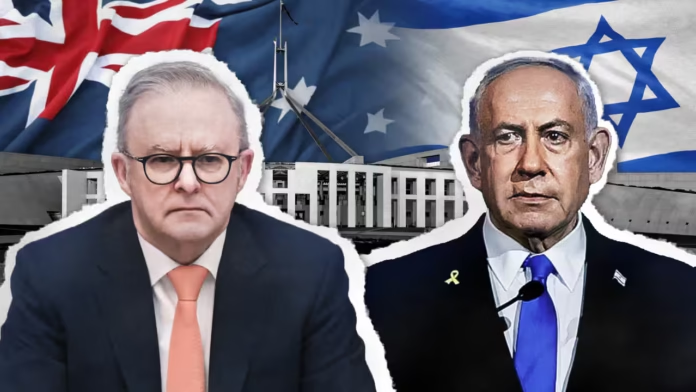Netanyahu’s Harsh Words for Albanese
Israeli Prime Minister Benjamin Netanyahu made a direct attack on Australian Prime Minister Anthony Albanese after Australia confirmed it would recognize a Palestinian state at the United Nations General Assembly in September. Netanyahu called Albanese “a weak politician who betrayed Israel and abandoned Australia’s Jews.” His statement was posted on his official X account, adding even more intensity to an already strained situation.
This was not a casual comment. It followed weeks of tension that began when Australia banned far-right Israeli lawmaker Simcha Rothman from entering the country. Canberra’s decision was based on concerns that Rothman wanted to spread division within Jewish communities in Australia.
Visa Clash Sparks More Anger

The conflict escalated when Australia’s Home Affairs Minister, Tony Burke, canceled Rothman’s visa. He accused Rothman of planning to spread hate. In response, Israel’s Foreign Minister Gideon Sa’ar retaliated by revoking visas for Australian diplomats working with the Palestinian Authority. He also warned that future visa applications from Australian officials would face strict review.
Israel framed Australia’s move as an attempt to fuel antisemitism. This added more pressure to an already difficult situation, showing that both sides were unwilling to step back.
Netanyahu’s Letter and Ultimatum
It later came to light through Sky News Australia that Netanyahu had written a strong letter to Albanese on August 17. In that letter, he demanded that the Australian leader take action against what he called “rising antisemitism” before September 23. That date is tied to the Jewish New Year, Rosh Hashanah.
In the same letter, Netanyahu accused Albanese of adding fuel to antisemitism by supporting Palestinian statehood. He argued that recognition of Palestine only rewards Hamas and threatens Jewish safety in Australia. Netanyahu even urged Albanese to follow former US President Donald Trump’s approach on such matters. His closing line was sharp: “History will not forgive hesitation. It will honour action.”
Australia’s Position on Palestine
Australia is not acting alone. Other nations, including France, Canada, and the United Kingdom, have also pledged to recognize Palestine during the UN General Assembly. Albanese justified the decision by pointing out that recognition depends on commitments from the Palestinian Authority. Those commitments include excluding Hamas from leadership, demilitarizing Gaza, and holding fair elections.
Foreign Minister Penny Wong defended the government’s choice, saying Israel under Netanyahu is isolating itself and weakening chances for peace. Meanwhile, Israeli opposition leader Yair Lapid condemned Netanyahu’s attack on Albanese, describing Netanyahu as “the most politically toxic leader in the Western world.”
Personal Analysis
This crisis shows how recognition of Palestine continues to divide allies. Australia is trying to show leadership by supporting international recognition efforts, but it is now facing sharp pushback from Israel. Netanyahu’s words went beyond normal diplomatic criticism. By calling Albanese weak and linking the issue to antisemitism, he raised the stakes in a way that makes future dialogue harder.
From my view, Netanyahu’s strategy appears to be aimed not only at defending Israel’s position but also at securing support among his own political base. His choice of words reflects deep frustration but also suggests he is trying to project strength. On the other hand, Australia’s position indicates that more Western nations are willing to openly support Palestinian statehood, even if it damages relations with Israel.
The coming months will likely reveal how much this recognition move reshapes alliances. If more countries join Australia, Netanyahu’s government may find itself with fewer friends on the global stage. What stands out is how fast the crisis escalated from a visa issue to a very personal political fight.
Sources: the-independent.com


